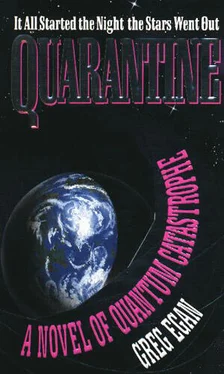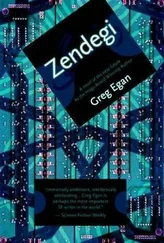Only one theory still makes any sense at all: Laura the escapologist. And if I still can't imagine how her hypothetical talent might work, I might just have to swallow the fact that I'm too stupid to figure it out. She escaped from the Hilgemann. She escaped from the inner room in the basement. There are alternative explanations, but they're all massively contrived. What do I think happened, the night I broke into BDI? Someone accidentally left the door unlocked, and she wandered out, locking it behind her? Given the lock's design, to do that without a key would have been as much of a feat as breaking out.
One thing's clear: if there is such a thing as telekinesis, then investigating and exploiting that could be a project worthy of an alliance on the scale of the Ensemble.
And if BDI have succeeded in capturing Laura's skills in a mod? Then that mod will need to be tested. By volunteers.
'Up. Down. Up. Up. Down. Up. Down. Up. Down. Down. Down. Up. Down. Up. Up. Down. Up. Down. Up. Up.'
The voice that fills Room 619 is calm and even, but almost certainly human; for all the anthropomorphic embellishments added to speech systems lately, I've yet to hear a scientific instrument grow hoarse from overuse.
The room is crammed with rack-mounted modules of electronic equipment; a fibre-optic control bus snakes from box to box. Amidst all the clutter, there's an elderly woman seated at a central console, staring at a large screen covered in multicoloured histograms; two young men stand beside her, looking on. Meta-Dossier (Mind-vaults, $3,950) instantly identifies all three, from its list of authorized personnel: Leung Lai-shan, Lui Kiu-chung, Tse Yeung-hon. All to be addressed as Doctor. Dr Lui glances my way briefly, then turns back to the screen; his colleagues ignore me completely. Chung Po-kwai is nowhere to be seen but I presume it's her voice coming over the speaker.
'Up. Down. Up. Down. Down. Down. Up. Down. Up. Up.'
Then I catch sight of her other bodyguard, Lee Hing-cheung, standing beside a connecting door, in front of which a vivid red hologram floats at eye level: keep out.We shake hands, and my copy of MetaDossier — via RedNet, and the infrared transceiver cells in our palms — engages in a rapid, coded dialogue with its counterpart in his skull, providing both of us with further confirmation of each other's identity.
He whispers, 'Am I glad to see you. Five more minutes of this shit and I'd be chewing the carpet.'
'Down. Down. Down. Up. Up. Down. Down. Up. Up. Down.'
'What do you mean? You've got Sentinel, haven't you?'
'Sure. But it doesn't help.' I give him a quizzical look, and he seems to be about to explain further, but then he changes his mind and just shakes his head ruefully. 'You'll find out.'
'Up. Down. Down. Up. Up. Up. Down. Down. Up. Up.'
Lee says, 'You know what she's doing in there?'
'No.'
'Sitting in the dark, staring at a fluorescent screen, announcing the direction that silver ions are deflected in a magnetic field.'
I can't think of an intelligent response to this, so I just nod. 'I'll see you in twelve hours.'
'Yeah.'
I take up a position by the door, but I can't help sneaking another look at the display which the scientists apparently find so engrossing. The histograms twitch and sway — but in the long run, every one of them seems to be retaining its basic shape; on average, all the fluctuations appear to be cancelling out. Meaning, I suppose, that whatever elaborate tests for randomness these graphs represent, the deflections of the silver ions are passing them all.
If I'm right about the telekinesis mod, then presumably Chung Po-kwai is trying to disrupt this randomness, trying to bias the motion of the ions in one direction; learning to use her new skills, starting with the smallest possible targets. But I don't understand why she's personally calling out the data. The computers must be monitoring the experiment via their own detectors, so why impose on the volunteer to provide a running commentary?
The histograms flicker hypnotically, but I'm not here to amuse myself watching the experiments. I turn away from the screen — and soon discover that the words alone are equally distracting.
'Down. Down. Up. Up. Up. Down. Down. Up. Up. Up. Up. Down. Up. Down. Down. Up. Down. Up. Up. Up.'
Some part of my brain seizes on every transitory pattern, every spurious rhythm — and, when each pattern unwinds, each rhythm decays, only strains harder to discern the next.
'Up. Down. Up. Up. Down. Down. Up. Down. Up. Up. Down. Down. Up. Up. Up. Down. Up. Down. Up. Down.'
Primed, I should have no trouble shutting this out, ignoring it. But incredibly, I can't. Lee was right — and P3is clearly no better than Sentinel. I can't stop listening.
'Up. Down. Up. Down. Down. Down. Down. Up. Down. Down. Down. Up. Down. Up. Up. Up. Up. Down. Down. Down.'
Worst of all, I find myself — unwillingly, compulsively — trying to guess each direction the instant before it's called. No, worse: trying to change it. Trying to impose some order. If I can't shut out this meaningless droning, the next best thing would be to force it to make some kind of sense.
Chung Po-kwai, I imagine, feels the same.
Each session lasts fifteen minutes, with a ten-minute break in between. Ms Chung emerges from the ion room — wearing wrap-around sunglasses to keep her eyes from losing too much dark adaptation — to sip tea, stretch her legs, and tap out snatches of odd rhythms with her fingertips on equipment casings. She speaks to me briefly, the first time, but then conserves her voice. The scientists ignore us both, busily reviewing their data and running esoteric statistical tests.
Each time the experiment restarts, I resolve to force myself to ignore the insidious random chant; after all, P3may have failed me, but, primed or not, I should have some vestige of native self-control. I don't succeed, but eventually I change tactics, and manage to reach a kind of equilibrium where at least I'm no longer compounding the problem by struggling, in vain, to attain the state of perfect vigilance to which I'm accustomed.
The scientists don't seem troubled at all — but then, it's data to them, not noise; they're under no obligation to try to ignore it.
So far as I can tell, the results don't improve as the experiment progresses, but I do notice one odd thing which I hadn't picked up before: the histograms are changing after each direction is called. It's easiest to see this when there's a run of ions all in one direction; most of the histograms grow steadily lopsided, and this trend doesn't reverse until the ion that breaks the run has actually been announced. But if the computers are collecting data straight from the equipment, this order of events is puzzling; whatever elaborate calculations are required to update the histograms, it's unlikely that they'd take more than a couple of microseconds to perform — which is certainly less than the time-lag between a human seeing a flash of light and announcing that it's 'up' or 'down'. Meaning what? The computers aren't plugged into the experiment? They're getting their data second-hand, by listening to Chung Po-kwai's words? That makes no sense at all. Maybe the scientists simply find the results easier to follow this way, so they've programmed in an intentional delay.
Dr Leung finally calls a halt at 20:35. While the three remain huddled about the console, debating the sensitivity of the sixth moment of the binomial distribution, Ms Chung nudges me and whispers, 'I'm starving. Let's get out of here.'
In the elevator, she takes out a small vial and sprays her throat. She explains, 'I'm not allowed to use this during the experiment — it's full of analgesics and antiinflammatory drugs, and they insist that I remain unsullied by pharmaceuticals.' She coughs a few times, then says, no longer hoarse, 'And who am I to argue?'
Читать дальше










